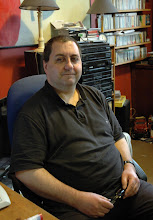And so it was that a motley collection of us assembled by the seaside to explore some of these challenges. The majority of people were over retirement age; however, a number of us were still of working-age. Sadly, we all had to stop working because of the onset of severe vision impairment. As a group, the causes of sight loss were varied: in some cases this had taken place gradually over a period of time, in a couple of cases onset had been very rapid, and in one case sight loss occurred overnight due to surgical complications. What we all shared, however, was the sense of grief and loss: the difficulty of accepting that we had to live with a disability, the complexities of navigating oneself around “the system”, and how varied support was from one part of the country to another.
One of the more interesting things I found was that provision of services was very much a “postcode lottery”; some NHS Trusts and local authorities were exemplary in the care and treatment that they provided, others far less so. It was good to discover that services within my own part of London (Lambeth) and the care provided by the local St Thomas’s Hospital, were well above average. It was also good to learn that I had been well looked after in respect of referral to the Low Vision Clinic at my local hospital, where the NHS provides a range of somewhat basic magnifiers and optical devices to help with some day-to-day living needs. It was also apparent that - although I had had to wait a long time to see her - the local authority rehabilitation worker had been good in her provision of some basic aids, such as my white stick, and in training to help me get around outdoors in my area. Some of the other participants had been less fortunate and it appeared they had received the bare minimum.
Many of us shared a common experience in that eye consultants were often a little bit reluctant to register patients as either blind or partially sighted; RNIB staff confirmed this. We put it down to the fact that doctors in this field were often unwilling to acknowledge that they had done everything they could to stop sight loss - and even more to restore vision that had already been lost. But registration is the passport to many services, for example, the local authority has a statutory obligation to provide an element of care for a person and to carry out a needs assessment, as well as being able to access specialist transport schemes.
The benefits of registration go far wider and, for example, open the door to some of the following:
- Eligibility for free or subsidised local public transport. In London, this takes the form of a Freedom Pass for use on all buses, tubes, trams and trains in the Greater London area
- Eligibility in London and some other local authority areas for the Taxicard scheme, which provides a number of subsidised taxi journeys each month
- Eligibility for a Blue Badge disabled parking permit
- Eligibility for a Disabled Person’s Railcard
- Eligibility for all sorts of discounted admission to cinemas, theatres, sports and concert venues
And there are financial benefits too. Registration as a blind person gives:
- Automatic entitlement to Disability Living Allowance (at lower rate mobility and care components)
- The Blind Person’s Tax Allowance
- Entitlement to working tax credits
- A statutory obligation for the local authority to reclassify your main residence to the next Council Tax band down from what it originally was
As is often the case with conferences and workshops, discussions with other participants and speakers can sometimes be more useful than the formal sessions themselves. It’s also a good means of networking and finding out about other sources of help, information and advice. Some of the workshop leaders were very inspiring in their examples of how they had come to live with their visual disability, and were now leading fulfilled and contented professional lives. I also learnt about “Sight Village”, a three-day event that takes place in Birmingham every July, where all the latest technology and gadgets designed for the visually impaired market are on display, as well as displays by organisations who might be able to provide assistance towards specialist aids.
So, all in all, a really useful weekend for anyone dealing with sight loss; a good way of getting some support at a difficult time; and, a valuable source of information and advice.

1 comment:
Hey Alex
I found your blog on whitestick.co.uk and thought I'd say hi! I enjoyed reading it, and was especially interested in the post about the discussion on in touch about people not wanting to have their sight restored. Its an interesting topic.
Post a Comment